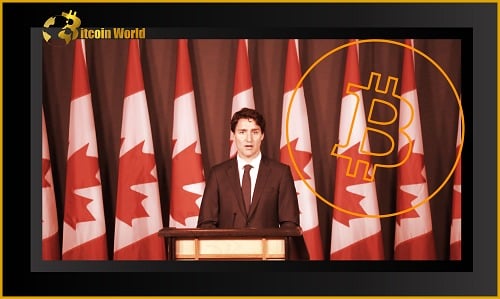Hold onto your hats, crypto enthusiasts! The saga of Canada’s ‘Freedom Convoy’ and the government’s unprecedented response just took another turn. Remember when Prime Minister Justin Trudeau invoked emergency powers, freezing millions in bank accounts linked to the protestors? Well, the plot thickens. According to CBC News, those emergency powers are being repealed, and the frozen funds are thawing out. But what does this all mean, especially for the world of crypto and financial freedom?
In a televised press conference that caught the attention of global financial watchers, Trudeau announced on February 24th that the situation on the ground was no longer deemed an ’emergency.’
“We’re ready to confirm that the situation is no longer an emergency,” Trudeau stated, signaling a significant shift in the government’s stance.
This declaration means the exceptional powers granted under the Emergencies Act, which allowed for the freezing of bank accounts without court orders, are now terminated. Trudeau reassured the public that “existing regulations and bylaws are now adequate to keep people safe.”
For context, the ‘Freedom Convoy’ protests, which began last month, saw demonstrators block streets and gather in front of Parliament Hill in Ottawa, demanding an end to COVID-19 mandates and restrictions. In response to these protests, the government invoked the Emergencies Act, leading to the freezing of approximately $8 million across 210 bank accounts linked to organizers and participants. However, the unfreezing process began swiftly, with Isabelle Jacques, Assistant Deputy Minister of Finance, confirming to a committee of MPs on February 23rd that “the vast majority of accounts are in the process of being unfrozen.” She added that this was “subject to any new information that the RCMP may have.”
Bitcoin: The Uncensorable Funding Route?
Here’s where things get really interesting for the crypto community. Facing roadblocks from traditional crowdfunding platforms like GoFundMe and GiveSendGo, which bowed to pressure and restricted funds, the ‘Freedom Convoy’ turned to Bitcoin. Using Tallycoin, a Bitcoin fundraising platform, they managed to raise a significant 21 BTC. At the time the fundraising concluded on February 15th, this Bitcoin stash was valued at around $902,000! This Bitcoin was then transferred to a different wallet with distinct key holders by the organizers.
This pivot to Bitcoin highlights a crucial aspect of cryptocurrency: its decentralized and censorship-resistant nature. In a world where traditional financial rails can be shut off by government decree or corporate policy, Bitcoin offered a potential lifeline for the protestors. Did Bitcoin become an unexpected tool for financial freedom in the face of government action?
Crypto Heavyweights Weigh In: Concerns Over Government Overreach
The decision to freeze bank accounts sparked outrage within the crypto industry. Prominent figures voiced strong concerns about government overreach and the implications for financial autonomy.
Jesse Powell, CEO of crypto exchange giant Kraken, didn’t mince words, tweeting on February 18th, “Due process is for plebs,” in response to the bank freezes. This tweet encapsulates the sentiment of many in the crypto space who view such actions as a direct threat to the principles of decentralization and individual financial control.
Brian Armstrong, CEO of Coinbase, another major crypto exchange, also expressed his unease, highlighting the slippery slope of government intervention in financial matters. The concerns weren’t limited to the crypto world. U.S. Senator Rand Paul, a Republican, voiced similar worries about government overreach, raising alarms about the potential for similar scenarios to unfold in the United States. This event has ignited a broader debate about the balance between national security, emergency powers, and individual financial freedoms.
Key Takeaways: What Does This Mean for Crypto and Canada?
- Bitcoin’s Resilience: This situation underscored Bitcoin’s potential as a censorship-resistant funding mechanism when traditional financial channels are restricted. It demonstrated a real-world use case for crypto in bypassing centralized control.
- Regulatory Scrutiny on Crypto Exchanges: The Canadian government’s actions, even though now reversed, highlight the increasing pressure on crypto exchanges to comply with government requests and regulations. This event could prompt further discussions on how exchanges should handle similar situations in the future.
- Debate on Financial Freedom vs. Government Power: The ‘Freedom Convoy’ bank account freeze and the subsequent reversal have intensified the global conversation around the appropriate limits of government power in financial matters, particularly in times of perceived emergency.
- Canada’s Crypto Landscape: While Canada has generally been considered relatively crypto-friendly, this event may lead to a more cautious approach from both regulators and crypto businesses operating within the country. The Bank of Canada and Canadian regulators will likely be watching the crypto space even more closely now.
In Conclusion: The Trudeau government’s decision to revoke emergency powers and unfreeze ‘Freedom Convoy’ accounts marks the end of one chapter, but the story’s implications for cryptocurrency and financial freedom are just beginning to unfold. This event served as a stark reminder of both the potential of Bitcoin as a decentralized financial tool and the ever-present tension between government authority and individual liberties in the digital age. As the dust settles, it’s clear that the intersection of crypto, regulation, and protest in Canada will continue to be a space worth watching closely.
Related Posts – Ferrari joins the NFT universe through a collaboration with a Swiss…
Disclaimer: The information provided is not trading advice, Bitcoinworld.co.in holds no liability for any investments made based on the information provided on this page. We strongly recommend independent research and/or consultation with a qualified professional before making any investment decisions.


